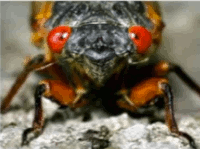| NIE Home | Sponsors | E FAQs | Order Form | Contact Us |

Common Core State Standard
SL.CCS.1/2/3/4 Grades 6-12: An essay of a current news event is provided for discussion to encourage participation, but also inspire the use of evidence to support logical claims using the main ideas of the article. Students must analyze background information provided about a current event within the news, draw out the main ideas and key details, and review different opinions on the issue. Then, students should present their own claims using facts and analysis for support. FOR THE WEEK OF MAY 13, 2013 Northeast braces for noisy invasion: Flying cicada bugs return after hiding for 17 yearsFind another article about nature or the environment and tell why it's of interest. What did you learn?
Now look for coverage from a different area of science or research. Tell why you would or wouldn't want to do the type of work described.
Select and discuss news about something coming to your area this spring, such as sports, entertainment or another event.
There's a buzz of talk about pesky insects that make a buzzing sound for real. They're known as cicadas (pronounced sih-KAY-duhz) -- 1 1/2-inch-long, slow-flying bugs with dark bodies and red eyes. Male cicadas are the noisy ones, sounding like a grass trimmer as they call to females. Scientists say the noise can reach 90 decibels — the same level as a lawnmower. Unlike ordinary cicadas seen occasionally in mid-summer, these ones appear just once every 17 years along the East Coast. This year's have been underground since 1996, shortly after they hatched from eggs, squirmed into the dirt and began sucking fluid from tree roots. Now they're ready to produce the next generation. They'll emerge in states from North Carolina to Connecticut by early June, once the soil temperature reaches 64 degrees. Rare sightings have been reported as far west as Nebraska and central Kansas. Some areas could have a couple million cicadas per street. (Yes, you read that right!) They don't bite or sting, but trees could lose small branches as they munch on leaves. For animals, they're a flying snack that's rich in protein. Birds, mice, raccoons, opossums and other animals eat cicadas. The spectacle, or nuisance, won't last long. Adults live only four to six weeks. But their 17-year life span after hatching makes them the longest-lived insects known.
Front Page Talking Points is written by
Alan Stamm for NIEonline.com, Copyright 2025
Front Page Talking Points Archive►Courts try to halt rushed removals of alleged gang members, testing presidential powers ►U.S. Education Department shrinks as the president tries to 'move education back to the states' ►Batter up: Odd-looking 'torpedo bat' apparently can help players smash home runs ►Top U.S. officials mistakenly leaked Yemen attack phone chat messages before jets and missiles flew ►Trump stirs drama with talk of wanting Greenland, Canada and the Panama Canal ►Measles outbreaks bring reminders of need for childhood vaccines ►White House media policy changes spark lawsuit by AP and concerns about presidential access ►'America has turned:' Trump veers away from backing Ukraine in war against Russian invaders |
Step onto any school campus and you'll feel its energy. Each school is turbocharged with the power of young minds, bodies, hearts and spirits.
Here on the Western Slope, young citizens are honing and testing their skills to take on a rapidly changing world. Largely thanks to technology, they are in the midst of the most profound seismic shift the world has ever seen.
Perhaps no time in our history has it been more important to know what our youth are thinking, feeling and expressing.
The Sentinel is proud to spotlight some of their endeavors. Read on to see how some thoroughly modern students are helping learners of all ages connect with notable figures of the past.
Online ordering
Now you can register online to start getting replica e-editions in your classroom.
Sponsors needed
Even small donations make a big difference in a child's education.
If you are interested in becoming a Partner In Education, please call 970-256-4299 or e-mail nie@GJSentinel.com

